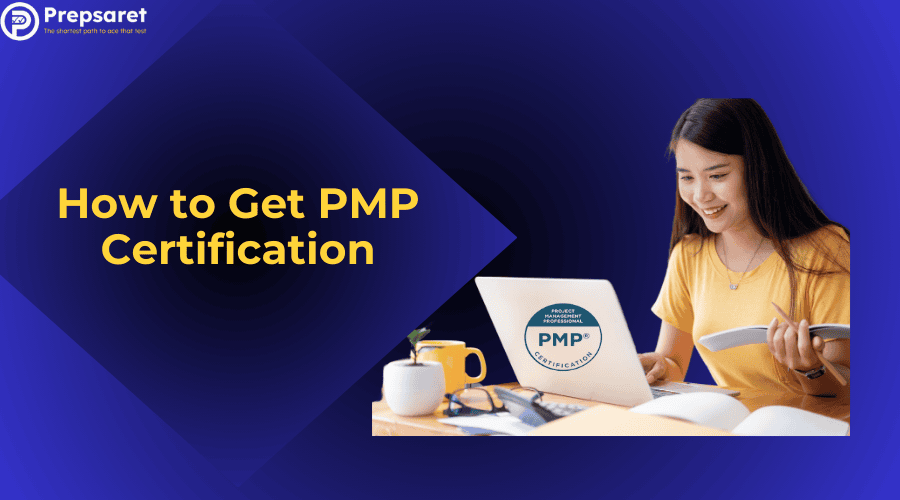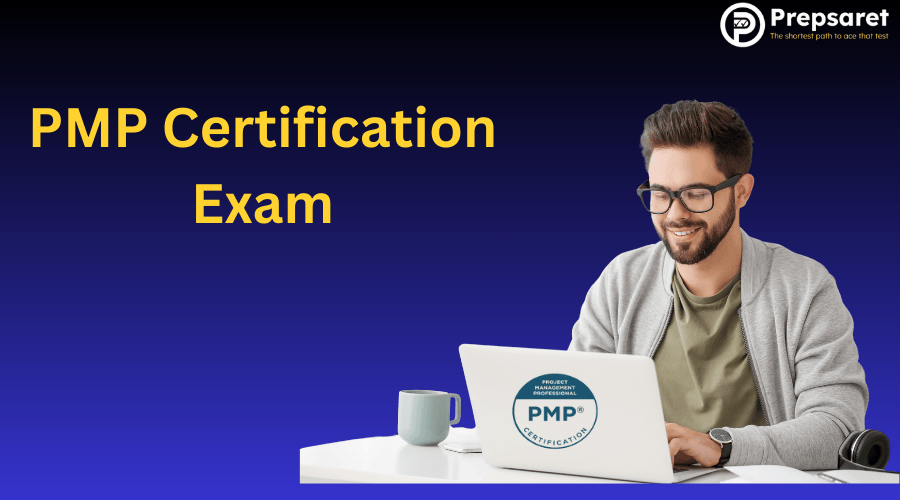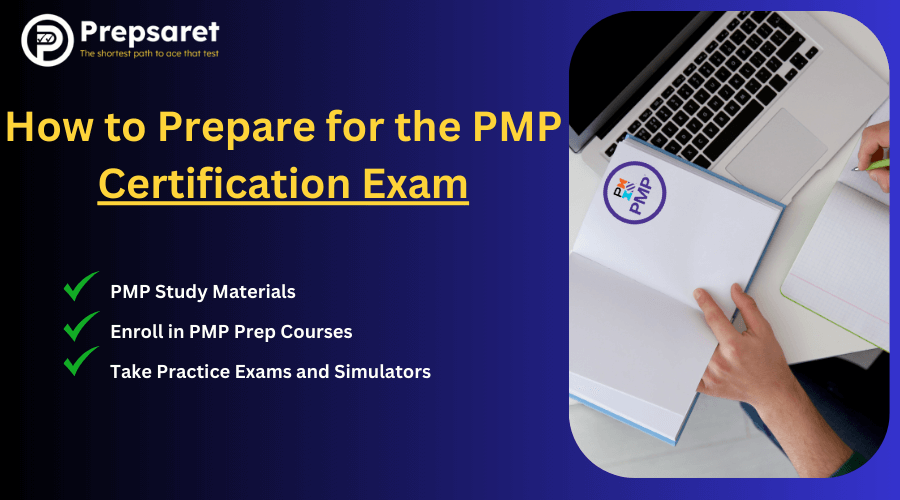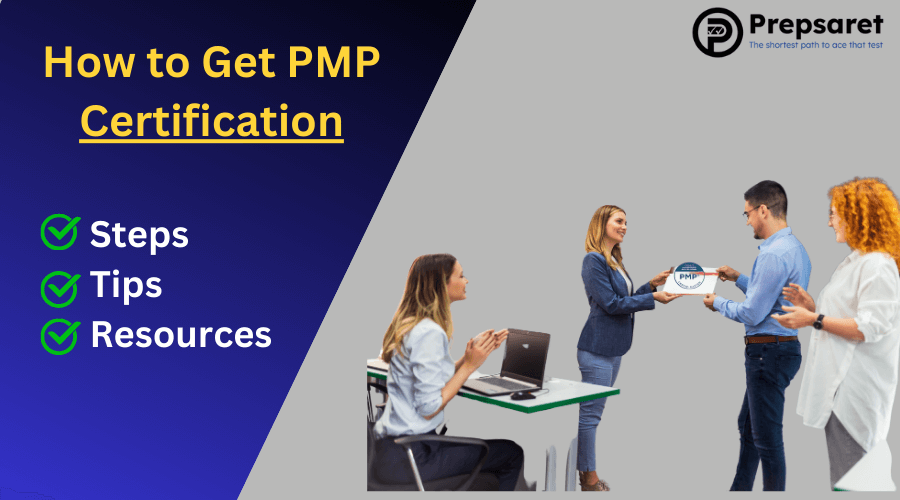The Project Management Professional (PMP)® certification is a highly regarded global credential that assesses a candidate’s ability to manage teams, processes, and business priorities. It’s relevant for project managers across various industries, including healthcare, construction, IT, and business.
To qualify for this certification, you must first complete 35 hours of project management education. After meeting this requirement, you can prepare for the exam by enrolling in the self-paced, online Prepsaret PMP prep program.
For more details on PMP certification requirements, costs, and exam questions, continue reading the article below.
How to Get PMP Certification

If you want to get a PMP certification, it’s essential to understand the process and requirements involved. The PMP certification is a prestigious credential that validates your expertise as a project manager.
Here’s a step-by-step guide to help you navigate the journey to obtaining this valuable certification:
Understand the PMP Certification Requirements
To qualify for the Project Management Professional (PMP) certification, you must meet specific educational and experience requirements:
- With a Bachelor’s Degree: 36 months of project management experience and 35 hours of project management education.
- With a High School Diploma or Associate Degree: 60 months of project management experience and 35 hours of project management education.
As of 2023, over 1.2 million professionals worldwide hold the PMP certification, demonstrating its widespread recognition and value across industries.
PMP Application Process
The application process involves several steps:
- Create an account on the PMI website and complete the online application.
- Submit details about your education, project management experience, and training hours.
- PMI reviews applications within 5 business days; selected applicants may undergo an audit requiring additional documentation.
Prepare for the Exam
To ensure you’re fully prepared, enroll in a PMP prep course offered by PMI Authorized Training Providers or self-paced programs.
Study materials like the Prepsaret test prep study materials and practice exams, will help familiarize you with the exam format. Regularly reviewing your notes and practicing with questions will reinforce your understanding.
Take the Exam
Once your application is approved and you’ve paid the exam fee, schedule your test with Pearson VUE. You can take it online or at a testing center. When you take the exam, make sure you’re well-rested and confident in your abilities.
Completion
Upon completion of the exam and receiving your results, you’ll officially earn your PMP certification if you pass. This marks the culmination of your efforts and signifies your expertise as a project manager in industries like healthcare, IT, construction, and business.
Maintenance
- Certification Validity: The PMP certification is valid for three years.
- Maintenance Requirements: To maintain your certification, you must earn 60 Professional Development Units (PDUs) within those three years. This involves participating in continuing education activities that enhance your project management skills and knowledge.
By following this structured process and ensuring thorough preparation, you’ll be well on your way to achieving your PMP certification and advancing your career!
PMP Certification
With over a million PMP certification holders worldwide, the PMP certification is considered the gold standard for project managers across various industries, including IT, healthcare, construction, and business.
Benefits of PMP Certification
- Global Recognition: The PMP certification demonstrates your expertise and commitment to the profession. Employers value PMP-certified professionals for their ability to manage projects effectively using standardized practices from the Project Management Body of knowledge.
- Higher Salary Potential: According to PMI surveys, PMP-certified professionals earn an average of 25% more than their non-certified counterparts. In some countries, this salary difference can reach up to 32%.
- Enhanced Career Opportunities: The demand for skilled project managers continues to grow globally. By earning the Project Management Professional Certification, you gain access to better job prospects and positions that require advanced project management skills.
- Improved Project Management Skills: The certification process strengthens your understanding of key methodologies and practices in project management, such as risk management, cost control, and stakeholder communication.
- Networking Opportunities: As a PMP-certified professional, you join PMI’s global network of members and local chapters. This allows you to connect with other professionals, share knowledge, and access career resources.
Industry-Specific Advantages
- IT Sector: PMP-certified project managers improve productivity through systematic approaches and are better equipped to handle risks effectively.
- Construction Industry: Certified professionals ensure better coordination between stakeholders and adhere to industry standards for quality assurance and cost management.
- Healthcare Sector: PMP certification helps streamline complex projects while maintaining compliance with regulations.
Role of PMI Members
Being a member of the Project Management Institute PMI offers additional benefits such as:
- Discounted exam fees
- Access to exclusive resources like webinars and publications
- Opportunities for professional development through local chapter events
Related Post: What Are the Advantages of PMI Membership
PMP Certification Cost
The cost of obtaining a Project Management Professional (PMP) certification from the project management institute involves several components, including training, exam fees, and membership costs. Here’s a breakdown of the typical expenses:
Training Costs
- Online Training: Prices vary widely depending on the provider, but generally range from $500 to $1,500 in the U.S. and from 5,000 to 20,000 INR in India.
- Classroom Training: Typically more expensive, with costs ranging from $800 to $3,000 in the U.S., and from 10,000 to 45,000 INR in India.
- Self-Paced Programs: Generally less expensive, often between $500 and $600 in the U.S.
- Affordable Prep Programs: Affordable yet effective study programs like Prepsaret start at $69 to $159.
Exam Fees
- PMI Members: The exam fee is $405.
- Non-Members: The exam fee is $555.
PMI Membership Fee : $139 annually
Whether you’re looking to advance your career or improve your project management proficiency through PMP certification training , the Project Management Professional PMP certification provides tangible benefits that make it a worthwhile investment.
PMP Certification Exam

The PMP certification exam is a key step in becoming a Project Management Professional. It evaluates a candidate’s ability to manage people, processes, and business priorities effectively.
Here’s what you need to know about the exam:
PMP Exam Structure
- The PMP exam structure includes 180 questions divided into five types:
- Multiple-choice
- Multiple responses
- Matching
- Hotspot
- Limited fill-in-the-blank
- It is a computer-based test with an allotted time of 230 minutes (3 hours and 50 minutes).
- Two 10-minute breaks are provided during the exam.
PMP Question Distribution by Domains
The exam questions are categorized into three domains:
- People (42%): Focuses on leadership skills, team management, and conflict resolution.
- Process (50%): Tests knowledge of methodologies, resource management, and project execution.
- Business Environment (8%): Covers compliance, organizational value delivery, and change management.
Where Can You Take the Exam?
- Testing Locations: The PMP exam can be taken in person at authorized Pearson VUE testing centers. Use Pearson VUE’s website to locate testing centers near you and check seat availability.
- Online Proctored Exam: For added flexibility, PMI also offers an online proctored version of the exam. This allows candidates to take the test from their home or office, provided they meet specific technical and environmental requirements.
- Scheduling Options:
- Schedule your exam online via Pearson VUE’s website.
- Call Pearson VUE customer service at +1 866 241 5527 (toll-free) or +1 952 905 7397 (toll) during business hours (Monday–Friday, 7:00 a.m.–7:00 p.m. CT).
PMP Preparation Tips
To prepare for the PMP exam effectively:
- Use a combination of study materials, including the PMBOK® Guide and other PMI-recommended resources.
- Take practice exams to familiarize yourself with the question format and time constraints. These tests help identify areas that need improvement.
- Create a study plan to ensure consistent preparation within your available time frame.
By thoroughly preparing with the right resources and practice tools, including earning professional development units you can confidently approach the PMP certification exam and take this significant step toward becoming a certified Project Management Professional PMP!
PMP Certification Training and Preparation
To qualify for the PMP exam, you need to complete 35 hours of project management education.
Here are some ways you can fulfill this requirement:
- Instructor-led Courses:
- Attend live classroom sessions or online instructor-led courses for interactive learning.
- Consider boot camp-style intensive courses for focused preparation.
- Self-paced Learning:
- Use video-on-demand courses or online modules that fit your schedule.
- Corporate training programs are also available for groups.
PMP Study Materials and Preparation

To be fully prepared for the exam, use these study materials:
- PMBOK® Guide: This is the primary reference for the PMP exam content.
- Practice Exams: Take practice tests to familiarize yourself with the exam format and identify areas for improvement.
- Exam Prep Books: Use books for in-depth explanations of concepts.
- Online Resources: Utilize webinars, articles, and forums for additional insights.
- Flashcards: Create flashcards to quickly review key terms and concepts.
Try Out: Free PMP Practice Questions
By using these study materials and practicing with different question types, you can ensure you’re well-prepared for the exam and increase your chances of success!
A structured study plan and high-quality resources are vital for preparing for the PMP certification exam. Essential study materials, benefits of PMP prep courses, and the importance of practice exams and simulators are discussed in this section.
Additionally, a strong understanding of the Project Management Body of Knowledge (PMBOK) is crucial for both exam success and effective application of project management practices in real-world scenarios.
These tools and strategies build the knowledge and confidence needed to excel on exam day.
PMP Average Salary
The Project Management Professional (PMP) certification can significantly boost your earning potential and career opportunities in the project management field.
Here’s an overview of the salaries and career prospects for PMP-certified professionals:
- The median salary for PMP certification holders in the United States is $120,000 as of 2023, up from $115,000 in 2021.
- In Canada, the average salary for project management professionals is reported to be $87,908 as of April 2024.
- Salaries can vary based on factors such as experience, industry, and location:
- Entry-level (0-1 years): $112,000
- Mid-career (4-6 years): $124,000
- Experienced (15+ years): $155,000
Career Opportunities
PMP certification opens doors to various career paths across industries:
- Information Technology (IT) Project Manager: Median annual salary of $142,530
- Construction Project Manager: Median annual salary of $93,370
- Engineering Project Manager: Average annual salary of $94,440
- Software Development Project Manager: Average annual salary of $86,372
Business Environment
The project management field is experiencing significant growth:
- A projected 25 million project managers will be needed globally across various industries in the coming years.
- Key sectors with high demand include technology, construction, manufacturing, and finance.
- The rise of AI and technological advancements is creating more opportunities for project managers with skills in people management, stakeholder engagement, budgeting, and resource management.
PMP certification not only increases earning potential but also enhances career prospects across diverse industries, making it a valuable investment for professionals seeking to advance in project management.
Continue Reading: How the PMP Certification Pays Off
Frequently Asked Questions
What Is The Best Way To Prepare For The PMP Certification?
The best way to prepare for the PMP certification is by enrolling in a training course, studying the PMBOK Guide, and taking practice exams regularly. Joining study groups and using diverse study materials can also enhance your preparation.
Can I Pass PMP In 3 Months?
Yes, you can pass the PMP exam in 3 months with a dedicated study plan. Allocate sufficient time daily, use varied study materials, and take practice exams to identify weak areas.
How Long Will It Take To Get PMP Certification?
The PMP certification process typically takes about 6 months for both PMI members and non PMI members . This includes time for application preparation, exam preparation, and receiving your certification after passing the exam.

